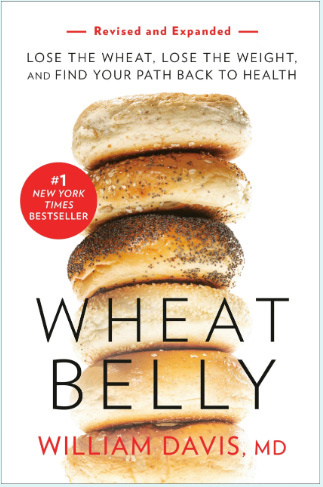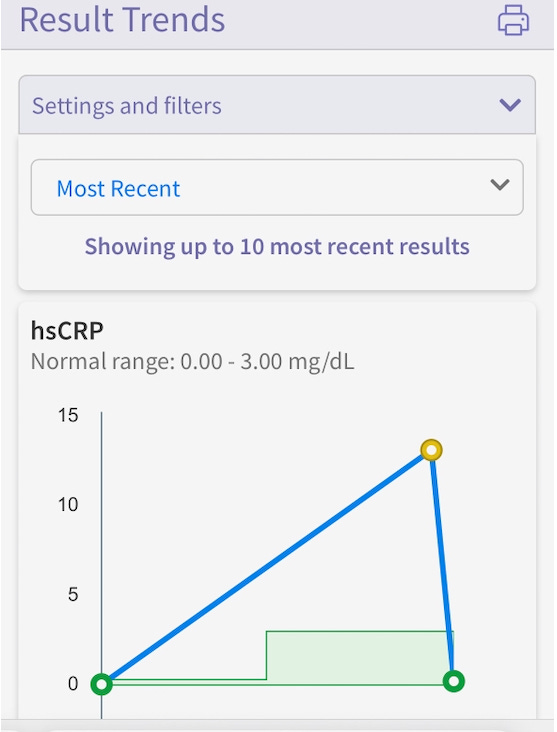Wheat Belly Book Review
Lose the Wheat, Lose the Weight, and Find Your Path Back to Health
In anybody’s health journey there are milestones when some change or discovery moves the needle in huge way. There have been a few for me but none more dramatic than implementing cardiologist William Davis’ protocol that he outlines in his best selling Wheat Belly book.
Prior to implementing his suggestions, I had the following issues that I could not seem to fix:
I was always sore. I chalked it up to paying hockey 2-3 days a week and getting older.
For close to a decade I had difficulty turning my head to the left. Again, I attributed this to playing contact sports for most of my life.
I had severe golfer’s elbow in both of my arms and it made it very painful to grab tools and I often had shooting pain in my elbows.
All of those issues literally disappeared within the first week and it was dramatic - I remember waking up one morning and I was not sore. A couple of days later I could move my neck and my golfers elbow was gone (and it never returned).
And its not just me. A good friend quit gluten about a year ago and texted me this lab result showing a huge drop in his hsCRP (high-sensitivity C-reactive protein - a biomarker used to measure inflammation in the body.). Needless to say, he is feeling much better.
Cliff Notes:
Dr. William Davis argues that modern wheat consumption is a major driver of various health issues, including obesity, diabetes, and chronic diseases. He believes that wheat has adverse effects on human health.
Dr. Davis’s Dietary Recommendations:
Dr. Davis advocates for a diet that eliminates all forms of wheat, including whole wheat, and focuses on whole, unprocessed foods.
He promotes low-carb, high-fat eating with an emphasis on vegetables, nuts, seeds, meats, eggs, and healthy fats. His recommendation is to have less than 15 grams of carbs each meal. Personally I loosely follow this and average about 90g-11g/carbs per day. Once you eliminate all grains you will see that meeting these numbers is pretty easy.
The book discourages consumption of sugar, refined carbs, and many processed foods marketed as "gluten-free," which can also be high in carbohydrates and unhealthy additives.
Challenges:
I will never go back to eating grains for the simple reason that I feel significantly better. That being said, there have been challenges including:
Weight loss. I lost 8 lbs in the first week. One thing I had to do was start to eat a lot more just to maintain my healthy weight.
Gluten is in a lot more than just bread and pasta. This does drastically cut down the number of food options, particularly when eating out.
A lot of people will think you are nuts.
MTHFR
The MTHFR gene variant is relatively common in the United States population (About 30-50% of the U.S. population carries at least one copy of the C677T variant and around 20-40% carries at least one copy of the A1298C variant). In 1996 the U.S. Food and Drug Administration (FDA) mandated folic acid fortification of enriched grain products which can lead to a double whammy for those with a MTHFR mutation.
Gluten can exacerbate inflammation and gut issues. If someone with MTHFR variants also has a gluten sensitivity, they might experience more pronounced negative effects because their body may already struggle with managing inflammation.
People with MTHFR variants already have impaired ability to metabolize folate into its active form (L-methylfolate). If gluten-related gut issues limit nutrient absorption, it could compound the effects of the MTHFR variant, leading to a greater risk of deficiencies.
MTHFR variants can lead to elevated homocysteine levels, which are linked to cardiovascular and neurological risks. Chronic inflammation caused by gluten sensitivity might indirectly worsen homocysteine levels by placing additional strain on methylation pathways.
If you want to see if you have a MTHFR mutation, see my post on How to use 23andMe to see if you have a MTHFR mutation. I do have this mutation and this maybe one of the reasons I saw such dramatic results.
What about "Heart Healthy Grains”?
As you are probably aware, our government recommends eating a lot of grains. This and other advice on the www.myplate.gov website like eating low fat dairy (never do that) and soy (never do that either) is really completely misguided and has contributed to the health crisis we now face.
Dr. Davis directly challenges the conventional notion that "heart-healthy whole grains" benefit cardiovascular health. He argues that modern wheat and other grains contribute to heart disease through several mechanisms (See his article on why wheat causes heart disease):
Elevated Blood Sugar Levels:
The carbohydrate amylopectin A in wheat rapidly raises blood glucose levels, leading to increased insulin production and promoting fat storage. This process can result in insulin resistance, a precursor to type 2 diabetes and a risk factor for heart disease. .
Formation of Harmful Lipoproteins:
High blood sugar from grain consumption leads to the creation of small, dense LDL particles. These particles are more prone to oxidation and can penetrate arterial walls, contributing to plaque formation and increasing the risk of coronary artery disease.
Triggering Inflammation:
Wheat contains gliadin, a protein that can increase intestinal permeability, allowing foreign substances to enter the bloodstream and trigger systemic inflammation—a key factor in the development of atherosclerosis.
Nutrient Malabsorption:
Compounds like phytates in wheat bind essential minerals such as iron, zinc, magnesium, and calcium, reducing their absorption and potentially leading to deficiencies that affect heart health.
Try It!
I would highly recommend reading the book and giving it a try (at least two weeks) - perhaps it will change your life as well. You have nothing to loose but pain, inflammation and weight.



